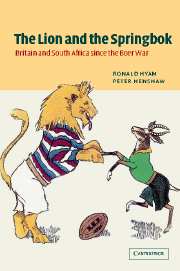Book contents
- Frontmatter
- Contents
- List of illustrations
- List of tables
- Preface
- Acknowledgements
- List of abbreviations
- 1 The uneasy special relationship: dynamics and divergencies
- 2 Breakdown: into war, 1895–1899
- 3 Post-war: the myth of magnanimity, 1905–1907
- 4 African interests and the South Africa Act, 1908–1910
- 5 ‘Greater South Africa’: the struggle for the High Commission Territories, 1910–1961
- 6 The economic dimension: South Africa and the sterling area, 1931–1961
- 7 Britain, the United Nations, and the ‘South African disputes’, 1946–1961
- 8 The political consequences of Seretse Khama and Ruth, 1948–1952
- 9 Containing Afrikanerdom: the geopolitical origins of the Central African Federation, 1948–1953
- 10 Strategy and the transfer of Simon's Town, 1948–1957
- 11 The parting of the ways: the departure of South Africa from the Commonwealth, 1951–1961
- 12 Enfeebled lion? How South Africans viewed Britain, 1945–1961
- 13 Springbok reviled: some British reactions to apartheid, 1948–1994
- Epilogue The relationship restored: the return of the new South Africa to the Commonwealth, 1994
- Select bibliography
- Index
10 - Strategy and the transfer of Simon's Town, 1948–1957
Published online by Cambridge University Press: 03 December 2009
- Frontmatter
- Contents
- List of illustrations
- List of tables
- Preface
- Acknowledgements
- List of abbreviations
- 1 The uneasy special relationship: dynamics and divergencies
- 2 Breakdown: into war, 1895–1899
- 3 Post-war: the myth of magnanimity, 1905–1907
- 4 African interests and the South Africa Act, 1908–1910
- 5 ‘Greater South Africa’: the struggle for the High Commission Territories, 1910–1961
- 6 The economic dimension: South Africa and the sterling area, 1931–1961
- 7 Britain, the United Nations, and the ‘South African disputes’, 1946–1961
- 8 The political consequences of Seretse Khama and Ruth, 1948–1952
- 9 Containing Afrikanerdom: the geopolitical origins of the Central African Federation, 1948–1953
- 10 Strategy and the transfer of Simon's Town, 1948–1957
- 11 The parting of the ways: the departure of South Africa from the Commonwealth, 1951–1961
- 12 Enfeebled lion? How South Africans viewed Britain, 1945–1961
- 13 Springbok reviled: some British reactions to apartheid, 1948–1994
- Epilogue The relationship restored: the return of the new South Africa to the Commonwealth, 1994
- Select bibliography
- Index
Summary
Various explanations have been put forward for the 1955 agreement to transfer the Simon's Town naval base from British to South African control: the base had lost its utility in the nuclear age; the British government wished to deflect South African economic pressure, to appease an expansionist Afrikaner nationalism, to effect a financial saving, or to muster a South African commitment to Middle East defence. Yet none of these, either singly or in combination, accurately explains the transfer. Rather, Simon's Town's transfer was conceded above all because, in the face of an increasingly strident Afrikaner nationalism, this was seen as the best and perhaps the last chance to strike a bargain ensuring both access to the base and effective naval collaboration.
This view represents a radical departure from some recent accounts. Geoffrey Berridge, mesmerised by South Africa's possession of gold and uranium, determined to prove an hypothesis about the role of ‘economic power’ in intergovernmental relations and, relying mainly on secondary sources, asserted that, contrary to the accepted wisdom, the agreements were ‘wholly in the Union Government's favour’ and derived from circumstances forced upon Britain by South Africa's economic might. British gains were merely ‘cosmetic embellishments’. The grant of availability to Britain and her allies in any war, and the expansion of the South African navy with purchases from British yards, were discounted as being ‘already assured’ by the pressures of the cold war and by a Commonwealth military association that was ‘already close’.
- Type
- Chapter
- Information
- The Lion and the SpringbokBritain and South Africa since the Boer War, pp. 230 - 253Publisher: Cambridge University PressPrint publication year: 2003



